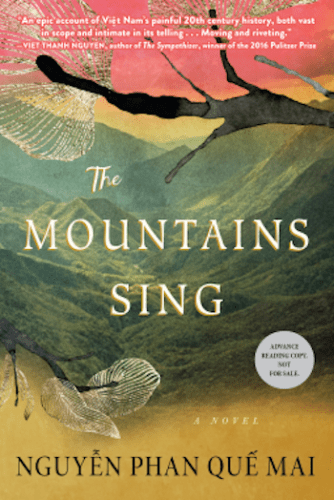Book Review: “The Mountains Sing” — The Power of Witnessing
By Landry Harlan
This is a love letter, told honestly and poignantly, to the Vietnamese people, an homage to their dedication to remembrance, during and after a painful time.
The Mountains Sing by Nguyễn Phan Quế Mai. Workman, 352 pages.

For decades, the full extent of the disastrous Vietnam War’s toll on Vietnamese civilians has been obscured (or would that be repressed?) by its combatants. American textbooks — and even Ken Burns’s not-so-comprehensive docuseries — pay scant attention to the terror of Vietnamese families huddling in homemade bunkers during U.S. bombing raids. Vietnam’s Communist government does no better, asserting claims of victory while turning a blind eye to the horrific aftermath of the Land Reform campaign of the 1950s, which left many former landowners homeless and starving during the War.
Fortunately, out of the fog of war comes The Mountains Sing, a fictional course-corrective in the form of an involving multigenerational saga that chronicles a North Vietnamese family’s path through suffering to redemption through the country’ arduous 20th century. This harrowing and unflinching tale — the product of interviews with hundreds — is the English-language fiction debut of Nguyễn Phan Quế Mai, who was born during the Vietnam War. Before this book she has authored multiple works in Vietnamese, including nonfiction and poetry.
Mai’s knowledge of Vietnamese society and history gives her novel a rich texture. The narrative is steeped in her homeland’s language and culture, which will be unfamiliar to many Western readers, such as the proverbs frequently doled out by Trấn Diệu Lan, the unwavering family matriarch at the heart of the story. Diệu Lan and her tenacious granddaughter, a budding writer nicknamed Guava, are the protagonists of two overlapping timelines that Mai skillfully shifts between, each illuminating the other. In one, Diệu Lan recounts in evocative flashbacks her coming of age in the 1920s after her wealthy family is shattered by the invasion of Japanese soldiers and the merciless “Wicked Ghost,” who leaves Diệu Lan scarred. Diệu Lan escapes with her five children to navigate a highway hellscape where, through a series of riveting set-pieces, hunger overwhelms and people are left behind.
How the Lan family members find their way back to each other, physically and emotionally, propels Guava’s narrative of living with Diệu Lan in ’70s Hà Nội. The horrors that ripped apart the family are still vivid. Guava’s mother returns from the war traumatized, blaming Diệu Lan for abandoning her children. A newly minted Party official uncle balks at Diệu Lan’s job trading black market goods. The need for forgiveness and reconciliation weigh heavily on the family. The Mountains Sing continually wrestles with how the Vietnamese people, torn apart by infighting, can bridge debilitating divides.
Ultimately, the story is more stirring than despairing. Diệu Lan isn’t defined by her tragic past, but by the way in which she perseveres to live a vibrant life. Also, Mai’s lyrical prose finds haunting beauty in ramshackle villages and fractured landscapes. Young rice plants “roll out in green carpets.” Returning to her ancestral home, Diệu Lan finds their treasured bang tree broken with roots protruding “into the air like raised, burned hands.” Though epic in scope (even at just 326 pages), the narrative is built out of spare sentences that resonate with the poeticism promised by the book’s title.
At a pivotal moment in the story, Diệu Lan tells Guava about the murder of her husband and brother, a moment lost in history to all but her. She urges Guava to remember that those in power may rewrite history, but the truth lives on in the memories of those who were there. The Mountains Sing proves her point about the power of witnessing. It is a love letter, told honestly and poignantly, to the Vietnamese people, an homage to their dedication to remembrance, during and after a painful time. As Diệu Lan reminds Guava in one of her parables, “While there’s still water, we will scoop.”
Only in the final act does the narrative’s propulsive pace lose a little steam. A romantic subplot seems shoehorned in for Guava, along with a shocking reveal that is resolved too fast to resonate very deeply. That said, The Mountains Sing offers a gripping, and necessary, lesson in a world that’s as divided as ever, despite the glib assurances of globalization. Family bonds can survive horrendous strife: as long as memory nurtures the possibility of love.
Landry Harlan is a writer based in Cambridge. He has written no books, but will happily and honestly tell you what he thinks about yours.

I’m two thirds of the way through this book. I’m grateful for your review because I’m now warned about the ending and will read on to the end.